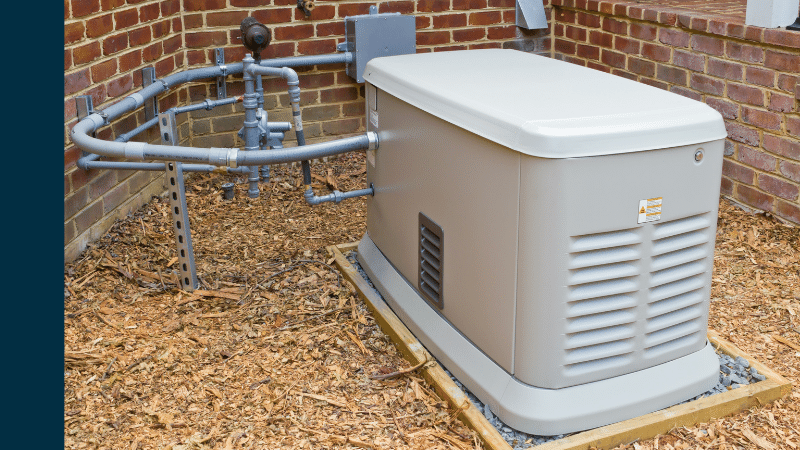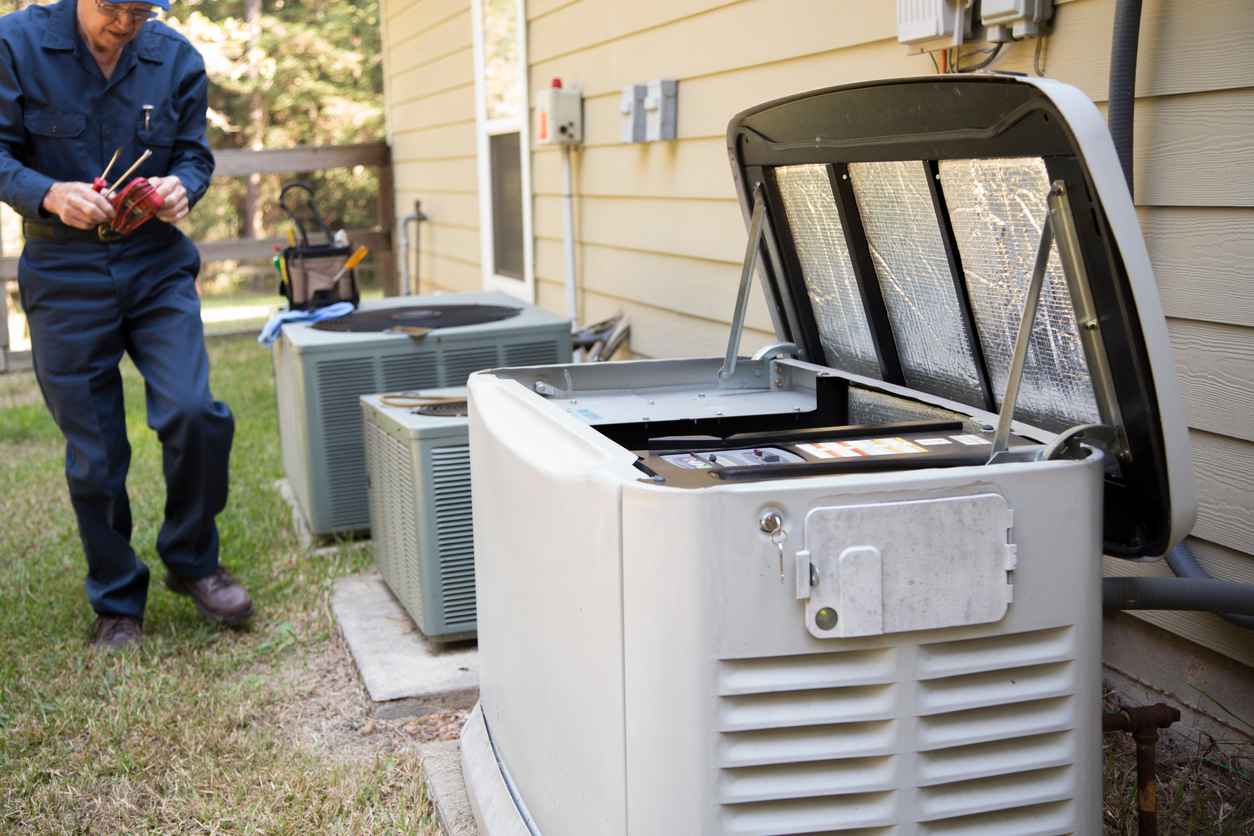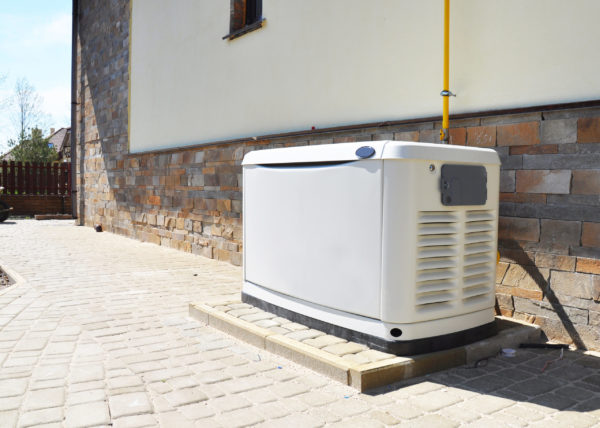Can A Whole House Generator Run Air Conditioner Efficiently? Yes, a whole house generator can run an air conditioner. The generator must have sufficient wattage to handle the AC’s power needs.
A whole house generator offers a reliable backup power solution during outages. Many homeowners wonder if these generators can support energy-intensive appliances like air conditioners. The key factor is ensuring the generator’s wattage matches or exceeds the AC’s requirements. Modern generators come in various capacities, making it easier to find one that fits your home’s needs.
Running an air conditioner on a whole house generator ensures comfort and safety during power outages. Proper planning and consultation with a professional can help select the right generator to efficiently manage your air conditioning system.

Credit: hvac.com
Types Of Generators
To run an air conditioner, understanding the types of generators is essential. Two main types are commonly used: standby generators and portable generators. Each has unique features and benefits.
Standby Generators
Standby generators are permanently installed outside the home. They connect directly to your electrical system. These generators can automatically detect power outages. They start up within seconds to provide electricity. Standby generators are powerful and can run multiple appliances, including air conditioners.
They are often powered by natural gas or propane. Standby generators are usually more expensive but offer convenience and reliability. They require professional installation and regular maintenance.
Portable Generators
Portable generators are smaller and more versatile. They can be moved around as needed. These generators run on gasoline or diesel. They are less powerful than standby generators but are more affordable.
Portable generators need manual start-up. They can run essential appliances, including smaller air conditioners. They are ideal for short-term or emergency use. Regular maintenance is necessary to keep them in good working condition.
| Feature | Standby Generators | Portable Generators |
|---|---|---|
| Power Source | Natural Gas/Propane | Gasoline/Diesel |
| Installation | Permanent | Temporary |
| Start-Up | Automatic | Manual |
| Cost | Higher | Lower |
| Usage | Long-term | Short-term |
Power Requirements
Understanding the power requirements is crucial for running an air conditioner with a whole house generator. This section will guide you through the essential details, ensuring your generator can handle the load efficiently.
Air Conditioner Wattage
Before using a generator, determine your air conditioner’s wattage. The wattage varies based on the model and size of the unit. Typically, a standard central air conditioner uses about 3,000 to 5,000 watts for startup. After starting, it uses around 1,000 to 2,000 watts for continuous operation.
Here’s a simple breakdown of common air conditioner sizes:
- Small AC Units: 5,000 to 10,000 BTUs – Approx. 500 to 1,500 watts
- Medium AC Units: 10,000 to 18,000 BTUs – Approx. 1,500 to 2,500 watts
- Large AC Units: 18,000 to 25,000 BTUs – Approx. 2,500 to 3,500 watts
Generator Capacity
Choosing the right generator capacity is essential. Your generator must handle both the startup and running wattage of your air conditioner.
Whole house generators come in various capacities. Here’s a table to help you understand typical generator capacities:
| Generator Size (kW) | Starting Watts | Running Watts | Suitable for |
|---|---|---|---|
| 10 kW | 10,000 watts | 8,000 watts | Small homes, small AC units |
| 15 kW | 15,000 watts | 12,000 watts | Medium homes, medium AC units |
| 20 kW | 20,000 watts | 16,000 watts | Large homes, large AC units |
Ensure your generator’s capacity exceeds your air conditioner’s peak wattage. This ensures smooth operation without overload. Calculate your home’s total power needs, including other essential appliances. This comprehensive approach ensures optimal generator performance.
Fuel Types
Choosing the right fuel type for your whole house generator is crucial. It directly impacts the generator’s performance and efficiency. Each fuel type has its own set of benefits and drawbacks. Let’s explore the most common fuel types: Natural Gas, Propane, and Diesel.
Natural Gas
Natural Gas is a popular choice for home generators. It provides a continuous fuel supply through the gas line. This eliminates the need for storage tanks. It is also environmentally friendly, producing fewer emissions compared to other fuels. The cost of natural gas is often lower, making it an economical choice. However, natural gas generators may require more maintenance. They also need a connection to a gas line, which can be a limitation.
Propane
Propane is another excellent fuel option for whole house generators. It is stored in tanks, making it portable and versatile. Propane burns cleanly and has a long shelf life, making it a reliable choice. It is also less likely to degrade over time compared to diesel. However, the cost of propane can be higher. You will need to regularly check the fuel levels and refill the tanks.
Diesel
Diesel fuel is known for its energy efficiency. Diesel generators are typically more durable and have a longer lifespan. They can handle heavy loads, making them suitable for larger homes. Diesel fuel is widely available and can be stored for a reasonable period. On the downside, diesel generators can be noisier and produce more emissions. They also require regular maintenance to keep them running smoothly.
Efficiency Factors
Understanding the efficiency factors of a whole house generator is crucial. These factors determine if it can run your air conditioner effectively. Let’s delve into some key aspects that impact efficiency.
Generator Size
The size of your generator plays a significant role in efficiency. A larger generator can handle more electrical load, including an air conditioner. It’s vital to choose a generator with the right capacity.
Here’s a simple table to help you understand generator sizes:
| Generator Size (kW) | Recommended Load |
|---|---|
| 10-15 kW | Small homes, essential appliances |
| 15-25 kW | Medium homes, multiple appliances |
| 25-50 kW | Large homes, air conditioners, and heavy appliances |
Load Management
Proper load management ensures your generator runs efficiently. It involves balancing the power usage of various appliances.
Consider these steps for effective load management:
- Prioritize essential appliances.
- Use energy-efficient devices.
- Avoid running high-power appliances simultaneously.
Using a load management system can automate this process. This system helps in distributing power evenly. It prevents overloading and ensures smooth operation.
Installation Considerations
Installing a whole house generator to run your air conditioner requires careful planning. Proper installation ensures safety and efficiency. Let’s explore the key installation considerations.
Professional Installation
Hiring a professional installer is essential for a whole house generator. Experts ensure the generator is correctly connected to your home’s electrical system. They also guarantee it can handle the load of your air conditioner. Incorrect installation can lead to dangerous situations and costly repairs. A professional will also provide maintenance tips to keep your generator running smoothly.
Permits And Codes
Before installing a whole house generator, check local permits and building codes. Some areas have specific requirements for generator installation. Failure to comply can result in fines or removal of the generator. Your professional installer will usually handle the permits for you. They will ensure the installation meets all local codes and regulations.
| Consideration | Details |
|---|---|
| Professional Installation | Ensures safety, correct connection, and load handling. |
| Permits and Codes | Compliance with local regulations to avoid fines. |

Credit: acesolvesitall.com
Maintenance Tips
Maintaining your whole house generator is essential for its longevity. Regular care ensures your generator runs smoothly, especially when powering your air conditioner. Follow these maintenance tips to keep your generator in top shape.
Regular Servicing
Regular servicing keeps your generator efficient. Schedule maintenance checks every six months. A professional technician should inspect and tune the generator. This includes checking the oil, filters, and spark plugs. Clean or replace filters as needed. Ensure all parts are in good working condition.
Regular servicing helps identify potential problems early. Fixing issues before they become bigger saves money. This ensures your generator is ready during power outages.
Fuel Management
Proper fuel management is crucial for generator performance. Use the recommended fuel type for your generator. Store fuel in a cool, dry place. Rotate your fuel supply every six months to keep it fresh. This prevents fuel degradation and ensures optimal performance.
Check the fuel levels regularly. Keep the tank at least half full to avoid air in the fuel line. This ensures a steady supply of fuel to the generator. In case of long-term storage, use a fuel stabilizer. This helps maintain fuel quality over time.
| Maintenance Task | Frequency |
|---|---|
| Oil Change | Every 6 months |
| Filter Replacement | As needed |
| Fuel Rotation | Every 6 months |
| Professional Inspection | Every 6 months |
Following these tips will help keep your whole house generator running efficiently. This ensures it can power your air conditioner when needed.
Cost Analysis
When considering a whole house generator to run your air conditioner, understanding the cost is crucial. This section breaks down the financial aspects into two main categories: Initial Investment and Long-term Savings.
Initial Investment
Installing a whole house generator requires an upfront cost. This includes the price of the generator and installation fees.
| Cost Component | Estimated Price |
|---|---|
| Generator Unit | $3,000 – $5,000 |
| Installation | $2,000 – $4,000 |
| Permits and Additional Equipment | $500 – $1,000 |
The total initial cost for a whole house generator can range from $5,500 to $10,000. The price varies based on the generator’s capacity and the complexity of the installation.
Long-term Savings
Despite the high initial cost, a whole house generator can lead to significant long-term savings. Here’s how:
- Energy Efficiency: Modern generators are highly efficient, reducing fuel costs.
- Reduced Downtime: Avoid costly disruptions during power outages.
- Increased Property Value: Homes with whole house generators have higher market value.
To illustrate the potential savings, consider the following:
- Avoided costs from spoiled food during outages.
- Reduced hotel stays during extended outages.
- Lower repair costs for appliances damaged by power surges.
Overall, the long-term savings can offset the initial investment within a few years. This makes a whole house generator a smart financial decision.

Credit: heatwaveheatingandcooling.com
Real-world Examples
Understanding whether a whole house generator can run an air conditioner can be tricky. To provide clarity, we have gathered real-world examples. These examples include detailed case studies and user testimonials. They help illustrate the practical usage and efficiency of whole house generators in running air conditioners.
Case Studies
Case Study 1: A family in Texas faced frequent power outages during summer. They installed a 22 kW whole house generator. The generator successfully powered their central air conditioning system. They reported no issues with cooling their home.
Case Study 2: A business in Florida needed uninterrupted air conditioning. They opted for a 25 kW generator. This generator kept their office cool during power cuts. Employees could work comfortably without any disruptions.
| Location | Generator Size | Outcome |
|---|---|---|
| Texas | 22 kW | Air conditioning worked well |
| Florida | 25 kW | Office stayed cool |
User Testimonials
John, California: “Our 20 kW generator runs our AC without problems. It’s a lifesaver during power cuts.”
Emily, New York: “We use a 24 kW generator. It keeps our home cool and comfortable. We never worry about power outages.”
Mike, Georgia: “My generator powers the entire house, including the air conditioner. It’s very reliable.”
- John, California: 20 kW generator
- Emily, New York: 24 kW generator
- Mike, Georgia: Whole house generator
Frequently Asked Questions
Can A Generator Run An Air Conditioner?
Yes, a whole house generator can power an air conditioner if it has enough capacity.
How Many Watts Does An Ac Need?
An average central air conditioner requires around 3500 to 5000 watts to run efficiently.
What Size Generator For Central Ac?
A generator with at least 20kW capacity is recommended for running a central air conditioner.
Can A Portable Generator Run An Ac?
A high-capacity portable generator can run an air conditioner, but ensure it meets the AC’s power requirements.
Does Ac Affect Generator Lifespan?
Running an air conditioner can strain a generator if it’s not properly sized, potentially reducing its lifespan.
Is It Safe To Run Ac On Generator?
Yes, it is safe if the generator is appropriately sized and installed according to guidelines.
Conclusion
A whole house generator can indeed run your air conditioner. It ensures comfort during power outages. Choosing the right generator size is crucial. Proper maintenance keeps your generator reliable. Investing in one can provide peace of mind. Enjoy uninterrupted cooling and keep your home comfortable year-round.
